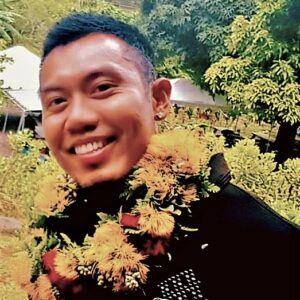Phillippe Fernandez-Brennan
PhD in Curriculum Studies Student

“My work through the Curriculum Studies PhD in Education program is to find empowerment within my own struggle and to build a stronger Filipino community in Hawaiʻi.”
Hometown
Kāneʻohe, HI
Department
Curriculum Studies
Related Degrees
- PhD, Education: Curriculum & Instruction
What degrees do you currently hold?
I have an MEd in Curriculum Studies (STEMS²), a PBCTE in Secondary Mathematics, and a BS in Civil and Environmental Engineering from UH Mānoa.
What does it mean to be the recipient of a Dr. Niki Libarios #BeKindToAStudent Award?
I am honored to have been selected as a recipient of the Dr. Niki Libarios award. He was my academic advisor when I entered the COE and was transitioning from a seven-year career as a civil and environmental engineer into education. He instilled in me a responsibility to inspire other Filipino educators, and I will work to continue his legacy through my research that is made possible with this award.
How did you become interested in the field of education? The Curriculum Studies Program?
I became interested in the field of education because my two cousins are educators and inspired me through their enthusiasm for their work. I later found out that three of my aunties were teachers in the Philippines before coming to Hawaiʻi in the 1960s and 1970s.
I became interested in the PhD in Education, Curriculum and Instruction program as a result of seven years teaching at Hālau Kū Māna Public Charter School (HKM). The work we did at HKM was grounded in Hawaiian culture-based education, community, and ʻāina. Through my foundational teaching experience at HKM, I have been able to synthesize that experience with many new ideas about my own identity as a Hawaiʻi-born Filipino and our struggle here for identity and empowerment. The focus of my doctoral studies is to find empowerment within my own struggle and to build a stronger Filipino community in Hawaiʻi.
Briefly describe your doctoral research/focus.
In 2010, the United States Census showed that Filipinos were the second most populous group and largest Asian population in Hawaiʻi. Despite this strong presence and the potential for collective empowerment, as a group, Filipinos are “on the lower rungs of the socioeconomic ladder” (McDermott & Andrade, 2011) and are positioned as subordinate under the racial and ethnic stratification in Hawaiʻi. This has had negative implications on the health of Filipino adolescents. Filipino youth have one of the highest rates of suicide ideation and attempts in the U.S., significantly higher depression rates than the general population, and alarming statistics on HIV/AIDS, unintended pregnancy, eating disorders, sexually transmitted diseases and drug use (David & Okazaki, 2016).
The purpose of my research is to describe how Hawaiʻi-born Filipino K–12 educators can be empowered through a collective decolonizing experience and to identify generative themes that may be used to empower the broader Filipino community in Hawaiʻi. My study focuses on post-1965 second, third, and fourth generation Filipinos of different genders who are professional educators in Hawaiʻi. My work will contribute to the body of knowledge of Filipinos in education, which is “a topic of research that is virtually non-existent” (Halagao & Libarios, 2016).
Where do you work?
I am a science teacher at Roosevelt High School. I teach integrated science and plants and animals of Hawaiʻi. I taught secondary math and science at Hālau Kū Mana Public Charter School for seven years.
How has the COE program impacted or benefited your career?
The COE program has impacted my career path because I chose a career that allows me to support the learning and identities of different ethnic groups, especially marginalized students that are in the HIDOE.
Is there anyone in particular who inspired you to pursue this career?
The most influential person in my education is Dr. Linda Furuto, my dissertation advisor and mentor since 2013 while I was transitioning from engineering into education. I was selected to be a participant in the Ethnomathematics program.
In the spirit of the #BeKindToAStudent scholarship, how will you pay it forward?
I find that being a teacher in high school makes me think about being kind to my students every day. I see their struggle for identity and community, and it makes me empathize with them and want to be an educator they can be their authentic selves with and to know that I acknowledge and celebrate all of their identities they bring to the classroom.
Is there anything else you would like to include?
My mom, Pricila Fernandez Graham and family are from Lanao, Bangui, Ilocos Norte. I am full Ilocano. My mom is one of 12 children. I have 50 first cousins on just my momʻs side of the family. My maternal grandpa is Juan Ramoran Fernandez, and my maternal grandma is Pascuala Rivera Fernandez. My mom came to Hawaiʻi from the Philippines in 1976 and raised my older sister and I in Kāneʻohe as a single mom.
